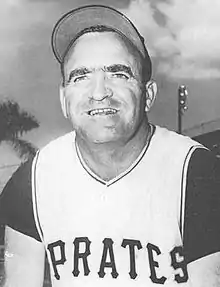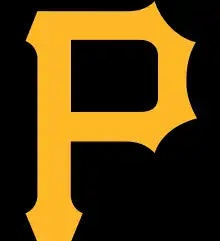| First meeting | May 2, 1882 Bank Street Grounds Alleghenys 10, Red Stockings 9 |
|---|---|
| Latest meeting | September 24, 2023 PNC Park Pirates 2, Reds 0 |
| Next meeting | June 17, 2024 PNC Park |
| Statistics | |
| Meetings total | 2,501 |
| Most wins | Pirates |
| Regular season series | Pirates, 1,248–1,235–18 (.503)[1] |
| Postseason results | Reds, 13-8 |
| Largest victory | Pirates: 23–4 (1912) Reds: 19–1 (1955) |
| Longest win streak |
|
| Current win streak | Reds, 1 |
| Post-season history | |
| |
The Pirates–Reds rivalry is a Major League Baseball (MLB) National League divisional rivalry played between the Pittsburgh Pirates and the Cincinnati Reds.
The Pirates and Reds are both members of the National League (NL) Central division. Both teams have been active rivals for more than 135 seasons, dating back well into the infancy of the MLB.
Background
The Pirates and Reds were both founded in 1881 in the American Association, beginning play in 1882, and playing each other for five seasons. The Pirates and moved into the National League in 1887, ceasing play between the two teams. The Reds moved into the National League in 1890, resuming play against the Pirates which continues to today.[2] The Pirates have won 5 World Series Championships in 1909, 1925, 1960, 1971, and 1979, and 9 NL Pennants. The Reds have also won 5 World Series Championships in 1919, 1940, 1975, 1976, 1990, and 9 NL Pennants. Both teams have met 6 times in the postseason; including 5 meetings in the NLCS.[3][4][5] From 1969 to 1993, the Pirates were a member of the NL East until the league's realignment in 1993 moved them to the newly formed Central Division.[6] Meanwhile; the Reds were previously members of the NL West until the realignment placed them in the same division as Pittsburgh in 1993.[7] Most recently; both teams have met in the 2013 National League Wild Card game.[8]
As of 2023, the Pirates currently lead the rivalry 1,248–1,235–18; however, the Reds lead in postseason wins 13–8.[9][10]
History

.jpg.webp)
1900s: Early History
During the infancy of the National League, both teams struggled out of the gate.[11][12] The Pirates saw most of their roster decimated as most had defected to the Players' League. Pittsburgh would manage brief periods of success headed into the new century; including three straight NL Pennants from 1901 to 1903 and a World Series victory in 1909.
Cincinnati fared much worse, failing to qualify for the postseason every season until 1919. Even then, the team arguably only won the 1919 World Series against the heavily-favorited Chicago White Sox because of the Black Sox Scandal. While the Reds weren't involved in the scandal, it tainted the legitimacy of their first World Series championship.
The Pirates managed to stay competitive, culminating in another World Series title in 1925. Both clubs managed levels of success at various times, though they often avoided one another heading into the postseason. The Reds finally managed their own turn of success with a World Series victory in 1940 (their first championship earned outright) whilst the Pirates were in the midst of a playoff drought for nearly two decades. Though, by the end of the 1950s, the Pirates briefly returned to success with another World Series victory in 1960, the Reds managed to win the pennant the following season; narrowly beating out the divisional rival Los Angeles Dodgers in the process, though the Yankees prevailed to win the Championship in five games. Both teams would soon spend the duration of the 1960s in a rebuild; however, by the turn of the decade, the competition quickly heated up.
1970s: Fierce NLCS Matchups


1970 NLCS
Right out of the gate as both teams started the 1970 season in their new ballparks; the Pirates would begin a string of winning the NL East for 5 of the first 6 seasons that decade, the Reds would win the NL West 4 of the first 6 seasons the same decade. On July 16, 1970, the Pittsburgh Pirates began play after the All-Star break by opening new Three Rivers Stadium against the rival Reds. Cincinnati's Tony Perez hit the park's first home run, and Willie Stargell later homered for the Bucs. The contest was decided on a 9th inning RBI single from Lee May to give the Reds a 3-2 decision. The two teams found themselves on a postseason collision course for the first time as the Pirates were armed with players such as all-star right fielder Roberto Clemente, star slugger left fielder Willie Stargell, and pitcher Steve Blass; they were armed to clash directly with the Reds, who by this season had armed a deadly batting lineup featuring such legends as Johnny Bench, Pete Rose, Tony Pérez, and Joe Morgan. Despite the showing of Pittsburgh's batting lineup; the Reds won the series in a sweep.[13]
Following the loss in the NLCS; the Pirates managed to beat the San Francisco Giants in 4 games en route to winning the 1971 World Series over the Baltimore Orioles.
1972 NLCS
The two clubs found themselves in each other's way once again during the 1972 NLCS. The Pirates prevailed in game 1 during a 5–1 victory in Pittsburgh. The Reds found themselves unable to overcome the dominant pitching from Steve Blass as they would go on to leave 11 baserunners with only a sole run in the first inning. Frustrations would run high for Cincinnati as manager Sparky Anderson would be ejected during the fourth inning. Game 2 saw the Reds bite back with a vengeance as they opened the first inning with 4 runs. The Pirates struggled mightily up until the fourth inning in which they'd manage to claw back with a run per inning up until the eighth. However; a Joe Morgan home run guaranteed the victory as Reds' pitcher Tom Hall locked up Pittsburgh's hitters to end the game. Game 3 saw a low-scoring affair with the Pirates holding on for a 3–2 victory by the end of the night in Cincinnati. Game 4 saw the Reds even the series with a blowout victory over the Pirates as Pittsburgh only managed a single run in the seventh inning while the Reds achieved 7 runs off of a panicked Pittsburgh bullpen. Game 5 began with a rain delay for 90 minutes. The Pirates fought hard with a 3–2 lead coming out of the fifth inning, however; the Reds would rob them of the victory with 2 crushing runs as Pirates' reliever Bob Moose tossed a wild pitch with George Foster on third, culminating in Hal McCrae scoring a 2 run homer during the next at bat, ending the series. This would be the final game ever played for Pirates' Hall-of-Famer Roberto Clemente as he would be killed in a plane crash after volunteering for earthquake relief in Nicaragua in December.[14]
1975 NLCS
Once again both teams met in the NLCS but the series proved to be largely uneventful as the Reds dominated the series with a 3-game sweep, though the Pirates held on to force game 3 into 10 innings, they would prove not to be a match for Cincinnati's hitters as they would end the series with 2 runs in the tenth.[15]
1979 NLCS
Nearing the end of their dynasty as the Big Red Machine, Cincinnati managed to pull ahead of a weak NL West en route to another matchup against Pittsburgh. Meanwhile; Pittsburgh pulled through 2 games ahead of the Montreal Expos to secure the NL East. The Pirates proved to have the upper hand this series as they would go onto decimate the Reds in a humiliating sweep, on their own way to win the 1979 World Series over the Orioles once again.[16]
1980s regression
The Pirates and Reds both saw a sharp regression from their heyday in the 1970s, ironically for the Reds, they finished with the league's best record in 1981 but headed into the all star break before a player strike suspended the season.[17] The Reds would fail to make the postseason as a result of the losses to the roster. The Pirates had sunken deep into mediocrity as they would fail to post a winning record until 1990, despite posting a winning record; the Reds finished in second place every season from 1985 to 1989, failing to make the postseason.
Early 1990s: Return to competition/1990 NLCS
The Pirates began the 1990s firing on all cylinders led by the strength of All Stars: Barry Bonds, Bobby Bonilla, Neal Heaton, and Doug Drabek. The Reds had quickly become the surprise of the league, armed with their own dominant roster under new manager Lou Pinella, they boasted such talents as Eric Davis, José Rijo, Randy Myers, and Chris Sabo they dominated the division with a 5-game lead over the rival Los Angeles Dodgers.
1990 NLCS
Both teams were set to square off in the 1990 NLCS as the Pirates managed to dominate a weak NL East to 95 wins.[18] The resulting series saw the Reds' famed Nasty Boys lock up the Pirates' usually dominant hitting core as the two teams combined for a low-scoring 6-game series, culminating in the Reds pulling away with the win, and eventually the 1990 World Series over the Oakland Athletics in a sweep.
1993-2000: Divisional Realignment/Decline
Following the 1990 season, The Reds declined mightily under the notoriously awful ownership of then-owner Marge Schott, the team saw multiple stars leave in free agency or fell victim to bad trades. Meanwhile; the Pirates managed two appearances in the NLCS in 1991 and 1992, ending in a loss to the Atlanta Braves both times. Due to the expansion of the league in 1993; the Reds and Pirates were both consolidated into the newly formed NL Central, turning their once heated playoff rivalry into a divisional battle. However; The Reds would only put up 2 winning seasons in 1994 and 1995, with a player strike and a sweep from the Braves in the 1995 NLCS sealing their decline. The Pirates would not manage a single winning season from 1993 to 2013.[19] Despite a 1999 Wild Card appearance against the New York Mets, the Reds would not post a winning season from 2001 to 2009.
2010s: Return to Relevance
Following years of mediocrity and bad management on both sides, Cincinnati would manage a playoff appearance after 8 mediocre seasons, only to be swept by the Philadelphia Phillies. The Reds' new manager Dusty Baker would also guide the team to an appearance in the 2012 NLDS.[20]
2013 NL Wild Card Game
The Pirates miraculously returned to playoff competition in 2013 as they finished second in the division with a 94–68 record, their first winning season since 1992. The Reds finished four games behind the Pirates, however; due to a weak National League season, they managed to secure the lowest remaining wild card berth; set to face the Pirates once again for the first time in 23 seasons. Led by star outfielder Andrew McCutchen, the Pirates slammed out 5 runs off of Reds' starting pitcher Johnny Cueto by the end of the fourth inning while the Reds would struggle to manage one by the end of the fifth. By the seventh inning, the Pirates had run away with a 6–1 lead as Cincinnati's bats went cold the majority of the game. The Reds managed another run in the eighth inning but failed to perform anything of note for the remainder of the game. The Pirates advanced on to play the St. Louis Cardinals in the NLDS, but fell in 5 games.
2015-Present: Decline for Both
The Pirates would manage two more postseason appearances following their run to the 2013 NLDS, they would lose to the World Series champion San Francisco Giants in a crushing 8–0 loss in 2014, and would go on to suffer another shutout loss to the Chicago Cubs 4–0 in 2015. Meanwhile; the Reds fired Dusty Baker on October 4, 2013, and Cincinnati has failed to post a winning record since 2013. The Pirates would fall victim to cheap ownership under Robert Nutting as numerous star players such as Andrew McCutchen, Starling Marte, Gerrit Cole, and Mark Melancon would all leave in free agency. During the 2019 season; both teams would engage in a massive brawl after Pirates' pitcher Keone Kela had thrown at Reds' batter Derek Dietrich in the seventh inning, the umpires would later give Kela a warning as Reds' star Joey Votto engaged in insulting the Pirates' dugout. Newly acquired outfielder Yasiel Puig would later go up to bat for the Reds before a controversial strike call from the umpire led to an argument between Puig and the home plate umpire. Frustrated with the call, Puig later threw down his helmet after several minutes of shouting, ending the inning. As Reds' pitcher Amir Garrett had taken the mound and had also engaged into a shouting match with the Pirates dugout after throwing at Pirates batter Chris Archer. After several minutes of shouting at the Pirates' players, Garrett charged the Pittsburgh dugout along with Puig; culminating in a massive brawl clearing both benches. Following the fight, Puig and Garrett would both be ejected from the game.[21] In total: six players would be suspended a combined total of 40 games, including Puig and Garrett.[22] An hour prior to the Pirates' final game of the 2019 season, manager Clint Hurdle was fired after eight seasons. Since 2015, only the Reds have made the postseason that being the 16 team postseason in 2020
Season-by-season results
| Pirates vs. Reds Season-by-Season Results | |||||||||||||||||||||||||||||||||||||||||||||||||||||||||||||||||||||||||||||||||||||||||||||||||||||||||
|---|---|---|---|---|---|---|---|---|---|---|---|---|---|---|---|---|---|---|---|---|---|---|---|---|---|---|---|---|---|---|---|---|---|---|---|---|---|---|---|---|---|---|---|---|---|---|---|---|---|---|---|---|---|---|---|---|---|---|---|---|---|---|---|---|---|---|---|---|---|---|---|---|---|---|---|---|---|---|---|---|---|---|---|---|---|---|---|---|---|---|---|---|---|---|---|---|---|---|---|---|---|---|---|---|---|
1880s (Red Stockings, 42–33–1)
| |||||||||||||||||||||||||||||||||||||||||||||||||||||||||||||||||||||||||||||||||||||||||||||||||||||||||
1890s (Reds, 75–66–5)
| |||||||||||||||||||||||||||||||||||||||||||||||||||||||||||||||||||||||||||||||||||||||||||||||||||||||||
1900s (Pirates, 132–81–4)
| |||||||||||||||||||||||||||||||||||||||||||||||||||||||||||||||||||||||||||||||||||||||||||||||||||||||||
1910s (Pirates, 109–102–4)
| |||||||||||||||||||||||||||||||||||||||||||||||||||||||||||||||||||||||||||||||||||||||||||||||||||||||||
1920s (Pirates, 118–101–1)
| |||||||||||||||||||||||||||||||||||||||||||||||||||||||||||||||||||||||||||||||||||||||||||||||||||||||||
1930s (Pirates, 140–79)
| |||||||||||||||||||||||||||||||||||||||||||||||||||||||||||||||||||||||||||||||||||||||||||||||||||||||||
1940s (Reds, 115–104–1)
| |||||||||||||||||||||||||||||||||||||||||||||||||||||||||||||||||||||||||||||||||||||||||||||||||||||||||
1950s (Reds/Redlegs, 134–86–1)
| |||||||||||||||||||||||||||||||||||||||||||||||||||||||||||||||||||||||||||||||||||||||||||||||||||||||||
1960s (Pirates, 92–90–1)
| |||||||||||||||||||||||||||||||||||||||||||||||||||||||||||||||||||||||||||||||||||||||||||||||||||||||||
1970s (Reds, 74–59)
| |||||||||||||||||||||||||||||||||||||||||||||||||||||||||||||||||||||||||||||||||||||||||||||||||||||||||
1980s (Reds, 64–50)
| |||||||||||||||||||||||||||||||||||||||||||||||||||||||||||||||||||||||||||||||||||||||||||||||||||||||||
1990s (Reds, 68–61)
| |||||||||||||||||||||||||||||||||||||||||||||||||||||||||||||||||||||||||||||||||||||||||||||||||||||||||
2000s (Reds, 87–77)
| |||||||||||||||||||||||||||||||||||||||||||||||||||||||||||||||||||||||||||||||||||||||||||||||||||||||||
2010s (Pirates, 92–91)
| |||||||||||||||||||||||||||||||||||||||||||||||||||||||||||||||||||||||||||||||||||||||||||||||||||||||||
2020s (Reds, 32–29)
| |||||||||||||||||||||||||||||||||||||||||||||||||||||||||||||||||||||||||||||||||||||||||||||||||||||||||
Summary of Results
| |||||||||||||||||||||||||||||||||||||||||||||||||||||||||||||||||||||||||||||||||||||||||||||||||||||||||
See also
References
- Inline citations
- ↑ "Head-to-Head Records". Baseball-Reference.com. Retrieved December 8, 2023.
- ↑ "Can't Beat Pirates v Reds".
- ↑ "Cincinnati Reds vs. Pittsburgh Pirates rivalry that has been overlooked & forgotten".
- ↑ "1990 NLCS: The Reds & Pirates Renew An Old Rivalry".
- ↑ "1970s Baseball:Pirates – Reds Rivalry Ranked Among the Decade's Greatest".
- ↑ "Pirates-Reds One Of Baseball's Most Underrated Rivalries".
- ↑ "Ranking the 25 biggest rivalries in MLB".
- ↑ "Pirates and Reds Renew a Rivalry".
- ↑ "Head to Head Records: Pittsburgh Pirates vs. Cincinnati Reds".
- ↑ "Reds vs. Pirates: Is It a Big Brother vs. Little Brother Rivalry in the Making?".
- ↑ "Cincinnati Reds: History Timeline".
- ↑ "Pittsburgh Pirates: Early Years".
- ↑ "1970 NLCS: A Postseason Rivalry Begins".
- ↑ "October 11, 1972: Reds' 9th-inning rally dethrones Pirates in Clemente's final game".
- ↑ "1975 NLCS: The Big Red Machine Handles The Pirates Again".
- ↑ "1979 NLCS: The Pirates Finally Get The Best Of The Reds".
- ↑ "For the Cincinnati Reds, 1981 was a hallmark – in two ways".
- ↑ "Top Cincinnati Reds games: No. 10 – Oct. 12, 1990, NLCS Game 6 won over Pittsburgh Pirates".
- ↑ "The 20 worst moments from the Pirates' 20 consecutive losing seasons".
- ↑ "Cincinnati Reds: The Good, the Bad and the Ugly from 2012".
- ↑ "Reds-Pirates brawl: Breaking down the very entertaining, bizarre fight starring Yasiel Puig and Amir Garrett".
- ↑ "Reds-Pirates brawl results in 40 games of bans".

